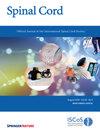在英国经历马尾综合征及其后护理的定性研究。
IF 2.2
4区 医学
Q3 CLINICAL NEUROLOGY
引用次数: 0
摘要
研究设计:定性、半结构化访谈。目的:马尾综合征(CES)是一种神经系统急症,可导致下肢永久性残疾,包括疼痛、无力、膀胱、肠道和性功能障碍。不同严重程度的CES患者的生活经验证据很少。这项研究试图解决这个问题。背景:访谈对象是在英国经历过CES并为此做过手术的人。方法:在已有的数据库上使用采样帧选择最大变异样本。访谈录音并转录,以供NVivo支持的专题分析。结果:22例患者(女性12例,男性10例)达到数据饱和,其中10例es -不完整,12例es -完整。平均年龄46岁,术后时间62个月。大多数访谈在患者家中或工作场所进行。数据分析确定了4个主要数据主题:(1)身体健康的不同优先事项;(2)医疗服务碎片化;(3)调整过程;4)预期性焦虑和自我价值感降低。结论:确定的主题证实了CES可能是一种慢性疾病,需要整体支持来解决长期结果。这突出了在CES研究中使用马尾综合征核心结果集(CESCOS)来记录这些结果的重要性。本文章由计算机程序翻译,如有差异,请以英文原文为准。
A qualitative study of experiencing cauda equina syndrome and its aftercare in the UK
Qualitative, semi structured interviews. Cauda Equina Syndrome (CES) is a neurological emergency that can cause permanent disability to the lower limbs, including pain, weakness, and bladder, bowel and sexual dysfunction. There is little evidence on the lived experience of patients with different severities of CES. This study sought to address this. The interviews were conducted with persons who had experienced CES and been operated on for this condition in the UK. A sampling frame was used on a pre-existing database to select a maximum variation sample. Interviews were audio recorded and transcribed for thematic analysis supported by NVivo. Data saturation was achieved with 22 patients (12 female, 10 male) of whom 10 had CES-incomplete and 12 had CES-complete. Average age was 46 years and time since the operation was 62 months. Most interviews took place at the patients’ home or workplace. Data analysis identified 4 main data themes: (1) Varying priorities of physical health; (2) A fragmented healthcare service; (3) The process of adjustment; and 4) Anticipatory anxiety and diminished sense of self-worth. The identified themes confirm that CES can be a chronic condition, which requires holistic support to address the long-term outcomes. This highlights the importance of using the Cauda Equina Syndrome Core Outcome Set (CESCOS) in CES research studies to record these outcomes.
求助全文
通过发布文献求助,成功后即可免费获取论文全文。
去求助
来源期刊

Spinal cord
医学-临床神经学
CiteScore
4.50
自引率
9.10%
发文量
142
审稿时长
2 months
期刊介绍:
Spinal Cord is a specialised, international journal that has been publishing spinal cord related manuscripts since 1963. It appears monthly, online and in print, and accepts contributions on spinal cord anatomy, physiology, management of injury and disease, and the quality of life and life circumstances of people with a spinal cord injury. Spinal Cord is multi-disciplinary and publishes contributions across the entire spectrum of research ranging from basic science to applied clinical research. It focuses on high quality original research, systematic reviews and narrative reviews.
Spinal Cord''s sister journal Spinal Cord Series and Cases: Clinical Management in Spinal Cord Disorders publishes high quality case reports, small case series, pilot and retrospective studies perspectives, Pulse survey articles, Point-couterpoint articles, correspondences and book reviews. It specialises in material that addresses all aspects of life for persons with spinal cord injuries or disorders. For more information, please see the aims and scope of Spinal Cord Series and Cases.
 求助内容:
求助内容: 应助结果提醒方式:
应助结果提醒方式:


